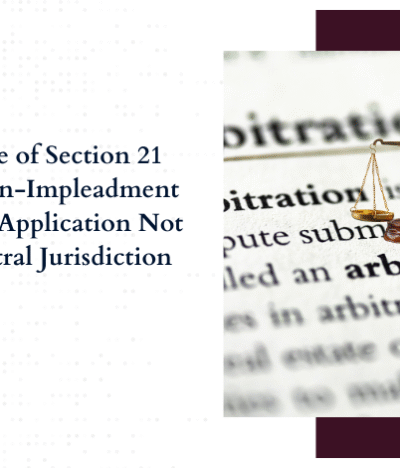Case Analysis: Rakesh Khanna v. Naveen Kumar Agrawal
Brief Facts of the Case
The petitioner, Rakesh Khanna, challenged an order by the National Consumer Disputes Redressal Commission (NCDRC), which upheld arrest warrants issued against him by the State Consumer Disputes Redressal Commission (SCDRC), Delhi.
These warrants were issued in execution proceedings to enforce an order from March 2021 requiring VXL Realtors Pvt. Ltd., of which Khanna was a director, to refund the complainant, Naveen Kumar Aggarwal, for alleged deficiencies in service and unfair trade practices. Khanna argued that he was not liable, as he joined the company as a director only in 2020, after the events leading to the complaint, and was not involved in the company’s daily management due to health reasons.
Issues
- Whether a director appointed after the initial cause of action can be held liable for enforcing compliance with an SCDRC order under the Consumer Protection Act, 2019?
- Whether the issuance of arrest warrants under the Consumer Protection Act (CP Act) by the SCDRC, without the CPC’s procedural compliance under Order XXI Rule 41, was lawful?
Legal Analysis
1. Director’s Liability in Enforcement of Consumer Protection Orders: The primary issue was whether Rakesh Khanna, as a director appointed after the cause of action arose, could be held responsible for enforcing compliance with the SCDRC’s order against VXL Realtors.
Section 72 of the Consumer Protection Act, 2019 (CP Act) provides the consumer commissions with powers akin to a Judicial Magistrate of the First Class to enforce compliance with their orders. This section is intended to ensure that any non-compliance with consumer orders carries significant penalties, including imprisonment for directors involved with the company at the time of enforcement.
The Hon’ble Court rejected the Petitioner’s argument that he could not be held liable since he was not a director during the company’s alleged misconduct. Citing Ravi Kant v. National Consumer Disputes Redressal Commission, the court emphasized that liability under the CP Act for compliance with orders extends to individuals responsible for the company’s affairs during the execution phase, not just at the time of the original offence.
In the afore-mentioned citation, it was held that individuals responsible for the operations and decision-making of a company are liable if they fail to comply with consumer commission orders, even if they were not directors during the initial misconduct.
Additionally, the court referenced Ashoke Mal Bafna v. Upper India Steel Manufacturing and Engineering Company Ltd. This case concerned Section 141 of the Negotiable Instruments Act, which limits liability to persons in charge of the company at the time the offense was committed. However, the court clarified that Section 141’s principle does not apply to the CP Act, which lacks a similar time-based limitation.
In consumer law, a director’s responsibility to enforce orders extends to those holding office at the time of the enforcement, as consumer law is remedial and emphasizes protecting consumer rights over narrow procedural technicalities.
2. Authority to Issue Arrest Warrants for Non-Compliance: The Petitioner argued that the issuance of arrest warrants violated Order XXI Rule 41(3) of the Code of Civil Procedure (CPC), which requires a court order for a judgement debtor to provide an affidavit of assets before issuing arrest warrants.
The court clarified that the consumer commissions derive their authority to issue such warrants not from the CPC but directly from Sections 71 and 72 of the CP Act.
Under Section 71 of the CP Act, the consumer commissions have the power to enforce orders as if they were decrees of a civil court, permitting the application of Order XXI of the CPC. However, Section 72(2) explicitly authorizes consumer commissions to act with powers equivalent to a Judicial Magistrate of the First Class, thus allowing them to issue arrest warrants directly for non-compliance.
This provision, the court explained, is crafted to prioritize swift enforcement of consumer rights without the procedural delays typical of civil execution proceedings under the CPC.
The court further noted that the petitioner’s reliance on procedural compliance under CPC’s Order XXI Rule 41 was misplaced, as the CP Act’s enforcement framework operates autonomously. This reasoning was supported by Rajnish Kumar Rohatgi &Anr. v. M/s Unitech Limited &Anr., where the NCDRC held that the authority to penalize non-compliance with consumer orders under Section 27 (now Section 72 in the CP Act, 2019) includes arrest warrants as a means to compel adherence, without needing the prior examination of the judgment debtor as stipulated by the CPC.
3. Obligation of Directors for Compliance Irrespective of Health and Resignation: The court addressed Khanna’s argument that his health conditions prevented him from overseeing VXL Realtors’ daily affairs. While acknowledging the challenges of his medical conditions, the court held that a director’s obligation to ensure compliance with judicial orders under the CP Act cannot be excused on personal grounds.
The NCDRC’s precedent in Rajnish Kumar Rohatgi emphasized that individuals in charge of the company’s affairs at the time of enforcement remain liable until the consumer commission’s order is satisfied.
Additionally, Khanna’s resignation from directorship on July 25, 2024, was deemed irrelevant to his liability for non-compliance before that date. Since the warrants related to actions during his tenure as a director, the court held that Khanna could not evade responsibility simply by resigning, as obligations incurred during directorship persist until the judgment is fully satisfied.
Court’s Conclusion
The Hon’ble Court dismissed the petition, affirming that Khanna, as a director at the time of enforcement proceedings, bore a statutory duty to ensure compliance with the SCDRC’s order. By clarifying that Sections 71 and 72 of the CP Act empower consumer commissions to issue arrest warrants independently of CPC procedural constraints, the court reinforced the remedial objectives of consumer law.
This ruling upholds the principle that consumer rights to timely relief and restitution outweigh procedural technicalities, especially when directors fail to enforce compliance.
Implications of the Judgment
This judgement underscores several key points for companies and their directors involved in consumer litigation:
1. Directorial Responsibility Beyond Initial Offenses: The decision reaffirms that directorial liability for non-compliance extends to those in charge of the company at the time enforcement proceedings are initiated, irrespective of when they assumed office.
This serves as a warning for directors that joining a company with pending judgments necessitates awareness and readiness to enforce compliance with existing orders.
2. Enhanced Powers of Consumer Commissions: By recognizing the broad authority of consumer commissions under the CP Act to issue arrest warrants, the court strengthens the enforceability of consumer judgments.
This decision encourages consumer commissions to leverage their quasi-judicial powers under Sections 71 and 72, promoting efficient enforcement of consumer orders.
3. Inapplicability of CPC Procedural Constraints in Consumer Law Enforcement: The judgment clarifies that while CPC provisions can supplement CP Act enforcement, they are not binding when they conflict with the CP Act’s objectives.
This position reinforces that consumer law prioritizes substantive justice over procedural limitations, thus providing stronger protection to consumer rights.
4. Accountability of Directors During Enforcement Proceedings: The court’s reliance on Rajnish Kumar Rohatgi emphasizes that directors are responsible for compliance throughout the enforcement stage, making it essential for directors to take proactive measures in ensuring consumer commission orders are fulfilled.
This ruling serves as a deterrent against attempts to evade responsibility via resignation or delayed compliance.
In sum, the Rakesh Khanna ruling strengthens the enforceability of consumer commission orders by holding directors accountable for compliance even if appointed after the initial cause of action. The judgement highlights the CP Act’s commitment to protecting consumer rights and ensuring prompt restitution, underscoring that directors cannot evade their statutory obligations by procedural or personal defences.






